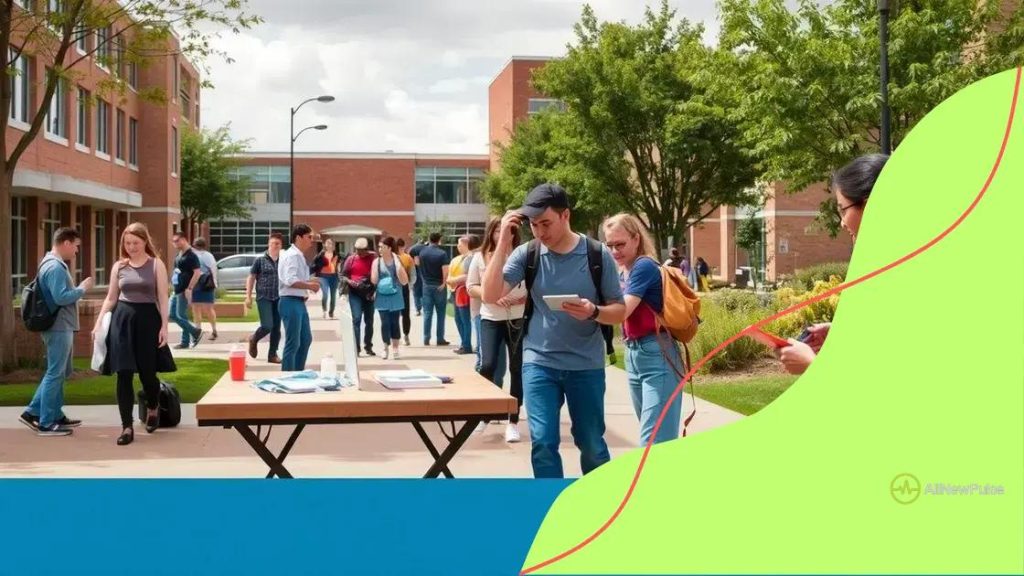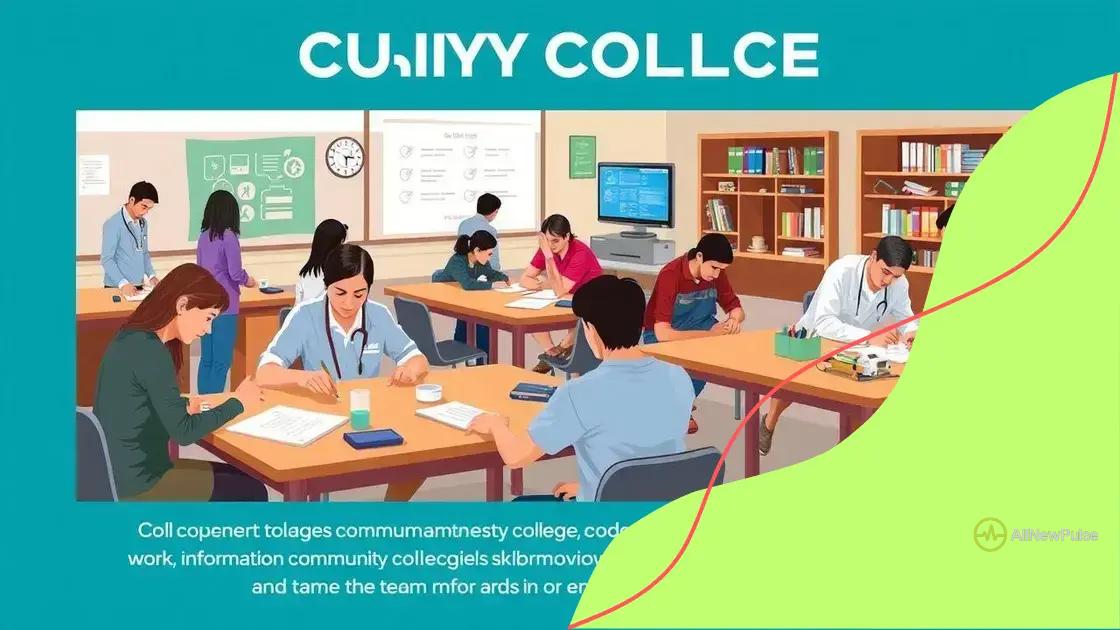The role of community colleges in workforce development

The role of community colleges in workforce development is vital as they provide targeted education and training that align with local job market needs, thus enhancing employability and supporting economic growth.
The role of community colleges in workforce development cannot be overstated. These institutions provide vital training and education that align with the needs of both students and employers. Have you ever wondered how they shape the workforce in your area?
Understanding community colleges
Understanding community colleges is essential to grasping their impact on workforce development. These institutions offer education and training that meet the needs of local industries and communities.
They provide accessible education options for individuals seeking new skills or looking to enhance their existing knowledge. Community colleges serve a diverse student body, including recent high school graduates and adult learners.
Defining Community Colleges
Community colleges are typically two-year institutions that focus on providing affordable education and vocational training. They play a vital role in bridging the gap between high school and four-year universities.
- Offer associate degrees and certifications
- Provide workforce training and skill development programs
- Facilitate transfer agreements with four-year colleges
The flexibility of these schools allows students to attend part-time or full-time, which can be especially beneficial for those balancing work and family responsibilities. As a result, community colleges contribute significantly to their local economies by preparing a skilled workforce.
Benefits of Community Colleges
One of the greatest advantages of community colleges is their affordability. Tuition rates are generally much lower than those at four-year universities, making higher education accessible to more people.
- Reduced financial burden on students
- Opportunities for scholarships and grants
- Shorter duration programs for quicker entry into the workforce
Additionally, community colleges often have smaller class sizes, allowing for more personalized attention from instructors. This supportive environment can lead to better learning outcomes and student retention.
Moreover, community colleges collaborate closely with local employers to tailor programs that align with industry demands. This ensures that students acquire relevant skills directly applicable to the job market.
Impact on local economies
The impact on local economies from community colleges is significant. These institutions not only provide education but also support job creation and economic growth.
By offering vocational training and degree programs, community colleges prepare students for local job markets. This helps create a skilled workforce that meets the needs of employers in the area.
Job Creation and Economic Growth
Community colleges play a crucial role in job creation. When students graduate, they often find jobs in their communities, reducing unemployment rates.
- Increase in local business productivity
- Employees with relevant skills for specific industries
- Encouragement for businesses to invest in the area
These colleges also contribute to economic development by forming partnerships with local businesses. They often tailor programs to address specific skill gaps identified by employers, ensuring that students are job-ready.
Support for Local Communities
In addition to education, community colleges foster community engagement. They host workshops, seminars, and events that bring people together. Such activities strengthen community ties and encourage civic participation.
- Accessible adult education classes
- Affordable enrichment and leisure courses
- Cultural events that attract visitors
Furthermore, community colleges enhance local economies by drawing in students from outside areas. This influx can lead to increased spending in local businesses and services.
By enhancing the skill set of its citizens, community colleges elevate local communities, making them more competitive and resilient in the changing job market.
Skill development and training programs

Skill development and training programs at community colleges are designed to meet the evolving needs of the workforce. These programs equip students with essential skills that are directly applicable to various industries.
Community colleges offer a range of vocational and technical courses, providing students with hands-on training and real-world experience. This practical approach enables graduates to enter the workforce with confidence.
Types of Training Programs
There are numerous programs available that focus on various fields. These include:
- Healthcare training, such as nursing and medical assisting
- Information technology courses, including programming and cybersecurity
- Trade skills, such as plumbing, electrical work, and welding
Each program is crafted to address specific industry needs, ensuring that students receive relevant instruction. As a result, many employers find graduates from community colleges to be well-prepared for their roles.
Partnerships with Local Employers
Community colleges often collaborate with local businesses to develop training programs. These partnerships help align educational offerings with the demands of the job market.
- Employers provide input on necessary skills and training methods
- Internship opportunities create work experience for students
- Job placement assistance helps graduates find employment
These partnerships are beneficial not only for students but also for employers. Businesses gain access to a skilled labor pool, while community colleges enhance their training programs with real-world relevance.
Furthermore, ongoing professional development is available for current employees, allowing them to upgrade their skills and stay competitive in their fields. This commitment to continuous learning fosters a culture of innovation and growth.
Success stories from community college graduates
Success stories from community college graduates showcase the impact these institutions have on individual lives and local communities. Many graduates have transformed their careers and achieved personal goals through their education.
Community colleges provide a path for many who may not have had access to traditional four-year universities. The stories of these graduates reveal how education can open doors to new opportunities.
Career Advancement
Numerous community college graduates have successfully climbed the career ladder after earning their degrees or certifications. Their experiences highlight the effectiveness of hands-on training.
- A nursing graduate who became a lead nurse in a local hospital
- An IT graduate who started his own tech company
- A welding graduate who found employment with a major manufacturing firm
These examples illustrate the direct connection between community college education and career advancement. Graduates gain the skills and knowledge needed to thrive in competitive job markets.
Personal Growth and Empowerment
Beyond career achievements, many graduates express how their education led to personal growth. Completing a degree or certification often boosts confidence and self-esteem.
- One graduate shared how she overcame personal challenges to earn her degree
- Another highlighted the friendships and networks formed during her studies
- A recent graduate spoke about the empowerment that comes from achieving academic success
These stories emphasize that community colleges are more than just educational institutions; they are platforms for personal transformation. By fostering a supportive environment, they encourage students to reach their full potential.
In conclusion, the success stories of community college graduates reflect the diverse paths individuals can take when given the chance to pursue education. Through hard work and dedication, they exemplify the significant role community colleges play in shaping lives.
Future trends in workforce education
Future trends in workforce education are shaping how community colleges prepare students for the job market. As industries evolve, there is a growing need for innovative educational approaches.
One significant trend is the integration of technology into educational programs. Online learning platforms and hybrid models are becoming more common, allowing students to learn at their own pace while accessing a wider range of resources.
Emphasis on Soft Skills
Alongside technical skills, there is an increasing focus on soft skills. Employers value communication, teamwork, and problem-solving abilities as much as technical expertise.
- Workshops on interpersonal communication
- Team-building activities to enhance collaboration
- Critical thinking exercises incorporated into the curriculum
These soft skills training sessions help students become well-rounded candidates who can adapt to various workplace environments.
Industry Partnerships
Collaboration between community colleges and local businesses is another key trend. Such partnerships ensure that curricula are aligned with current industry needs and provide students with real-world experience.
- Internships and apprenticeships offer hands-on training
- Curriculum updates based on employer feedback
- Guest lectures from industry professionals enrich learning
This synergy not only enhances the learning experience but also helps students transition smoothly into the workforce after graduation.
Moreover, there is a shift towards lifelong learning. As job requirements change rapidly, promoting continuous education through upskilling and reskilling programs is essential. Community colleges are adapting to this trend by offering flexible courses that cater to working adults.
Overall, these future trends indicate a dynamic educational landscape where community colleges play a vital role in preparing tomorrow’s workforce.
FAQ – Frequently Asked Questions about Community Colleges and Workforce Development
How do community colleges support workforce development?
Community colleges provide targeted training programs that equip students with the skills needed for local job markets, enhancing employability.
What types of programs do community colleges offer?
They offer a variety of programs, including vocational training, technical certifications, and associate degrees in fields like healthcare, IT, and trades.
How can students benefit from internships through community colleges?
Internships provide students with hands-on experience and networking opportunities, which can lead to job placements after graduation.
Why is lifelong learning important in today’s job market?
Lifelong learning allows individuals to adapt to changing job requirements and technologies, ensuring they remain competitive and up-to-date in their fields.





